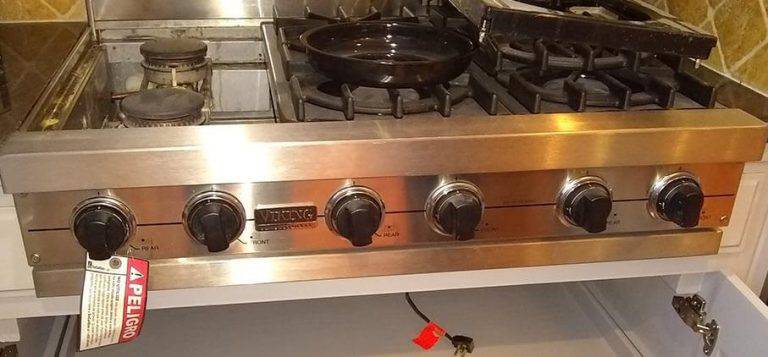- Home
- /
- Company’s Blog
- /
- Blog
- /
- Why Do I Smell Gas...
Why Do I Smell Gas Coming From My Oven?
We all rely on our ovens to get the job done in the kitchen, but if you have a gas oven and smell the telltale odor of natural gas (and its stinky additive), your kitchen work grinds to a screeching halt. Natural gas is nothing to play around with, and smelling gas is a sign of potentially hazardous conditions. If you smell gas coming from your oven, you need to act as soon as possible. This guide will take you through a few possibilities, and help to solve your problem. Read on for more information or call us at (800)657-0765.

Important Safety Note
It’s important to follow certain safety precautions when working with appliances. Always unplug the appliance before servicing it or opening up the appliance cabinet. Wear appropriate clothing to protect yourself, and always work in a well-lit area with the right tools for the job. If you ever feel hesitant to work on an appliance, call a professional to help you out.
When working with natural gas appliances in this situation, take these points into consideration as well: always turn off the natural gas supply at the appliance, or at the home main if there is no appliance shut off. This guide deals with a smell of gas coming from the oven, but if you suspect your home or appliance is leaking natural gas, it is important to shut off all gas supply to the house and seek a safe area immediately. Don’t reenter the house until you’ve called the proper natural gas authorities in your area.
Step 1. Hot Surface Igniter
In cases where you smell gas coming from your oven, it is likely that the hot surface igniter has failed. This means that when you attempt to light a burner, gas is escaping free without being lit. Most ovens have safety features to prevent too much gas from escaping without the hot surface igniter in operation, which is why you are only smelling a faint odor of natural gas, and not a full leak. A fully operational stove or oven should light within one minute of being turned on. If it doesn’t, check the hot surface igniter.
Hot surface igniters can last up to 10 years, but then they may fail and need to be replaced. Use your owner’s manual to locate the hot surface igniter in your appliance. Follow all of the safety precautions listed above when working inside of an appliance. Once you’ve found the igniter, check it for signs of damage like holes or blistering. Also check the surrounding connections and wires, as well. If you see signs of damage, replace it with an identical hot surface igniter.
Step 2. Gas Valve
Related to the hot surface igniter, one safety feature of modern gas ovens is the gas valve, or safety valve. The gas valve will not open unless the hot surface igniter is at full temperature. However, if the hot surface igniter is receiving at least some level of current, it may still get hot enough to partially activate the gas valve. This means that a small amount of gas may be released from the oven without it igniting. This is another case in which the hot surface igniter should be inspected for proper operation, as a faulty hot surface igniter will allow the valve to open just enough for you to smell gas coming from your oven.
Step 3. Cleaning
Be sure to keep your gas oven or stove clean at all times. This is important with all appliances, but especially so in the case of natural gas appliances. Be sure that you immediately clean up any fluids which spill onto your cooktop, and take care to clean under the cooktop if your appliance has such a setup.
Cooking fluids, grease, and grime can build up everywhere, so pay close attention to components like the burner cap. Be sure not to use powdered cleaners on area such as the cap or other burner surfaces, as powdered cleaners can become clogged inside burner ports and lead to various issues with ignition. Instead, use a warm cloth with lightly sudsy water. A toothbrush, bristle brush, or lightly abrasive cloth can help you get stuck-on grime off. Just call us for help at (800)657-0765.
If you smell gas coming from your oven, be sure to pay close attention to any burner ports. Clogged burner ports can cause partial ignition of burner surfaces, which means that natural gas may be able to exit from the burner and become detectable to you in the kitchen. Cleaning the burners as suggested above will make sure that they are open and igniting natural gas freely.
Step 4. Preventative Maintenance
Finally, consider the value of preventative maintenance. All natural gas appliances should be inspected annually by a professional oven repair technician. This should include a visual and electrical inspection to be sure that all components are operating correctly. If your appliance has a warranty or limited warranty, you should inquire with the manufacturer about the possibility of preventative maintenance inspections being covered by the warranty. Such a deal can save you time, money, and effort.
